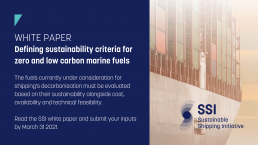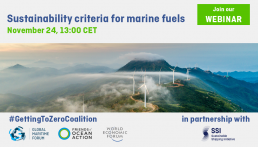Time period: 2020-Present
Members involved: Lloyd’s Register, Maersk, WWF
Partner: Copenhagen Business School (CBS) Maritime, Green Shipping Project
Ocean transportation is currently the most environmentally sound mode of transport in terms of CO2 emissions per tonne of cargo transported. Despite this, shipping is still responsible for 2.6% of total global anthropogenic CO2 emissions, which is broadly equivalent to the emissions of Germany.
The adoption in April 2018 of the IMO initial strategy on the reduction of greenhouse gas (GHG) emissions from ships sets out a vision to reduce GHG emissions from international shipping and phase them out entirely in line with the goals of the Paris Agreement. For this to be possible, zero-emission vessels (ZEVs) must enter global fleets as soon as possible.
An initial review showed the sustainability issues surrounding the alternative fuels being explored for shipping’s decarbonisation remain unclear, posing a challenge for the eventual selection of one or more winning fuel options for zero emission shipping.
In 2021, SSI worked to identify a set of sustainability issues, principles and criteria for the alternative fuels under consideration in shipping’s decarbonisation. By engaging with stakeholders including fuel users (such as shipowners) and fuel producers, SSI sought to understand the landscape of sustainability concerns as well as potential areas for action.
- Report: Defining sustainability criteria for marine fuels (September 2021)
- White paper: Preliminary sustainability issues and principles (February 2021)
The sustainability criteria for marine fuels in 2021 was conducted across three phases:
Phase 1: Preliminary compilation of sustainability criteria for marine fuels and presentation of preliminary criteria at key industry forums for initial testing/validation and feeding into ongoing industry initiatives
Phase 2: Research and consultations on sustainability criteria for marine to validate/challenge the preliminary criteria developed in phase 1; explore existing sustainability standards and certification of relevance for marine fuels; and understand stakeholder perceptions and the application of these
Phase 3: Facilitation of the development of a sustainability standard/certification for marine fuels, through engagement with standards and certification bodies to use SSI’s work as a building block to develop a sustainability standard and/or certification for marine fuels
- Define sustainability criteria for the fuels being considered as part of shipping’s decarbonisation, to establish their sustainability credentials and facilitate certification, includnig production processes and other inputs that may be relevant for lifecycle assessment
- Map existing sustainability standards, targets and certifications of relevance for alternative fuels.
- Facilitate an assurance process and common reference point for the industry around sustainability criteria for zero and low carbon fuels.
News & Resources
SSI presents at the Our Ocean Conference
March 13, 2023
Defining sustainability criteria for marine fuels
September 8, 2021
Infographic: The well-to-wake lifecycle of zero and low carbon fuels
September 8, 2021
Webinar: Sustainability criteria for marine fuels
December 3, 2020









